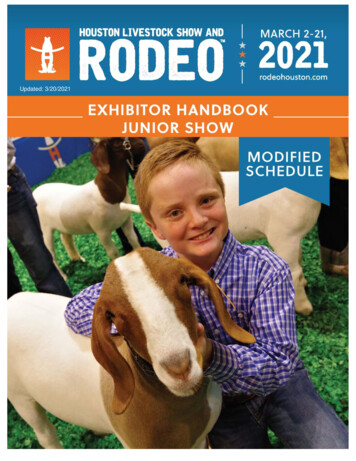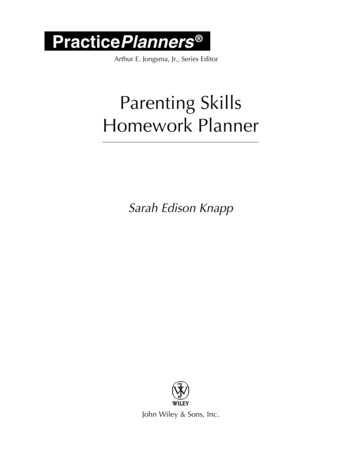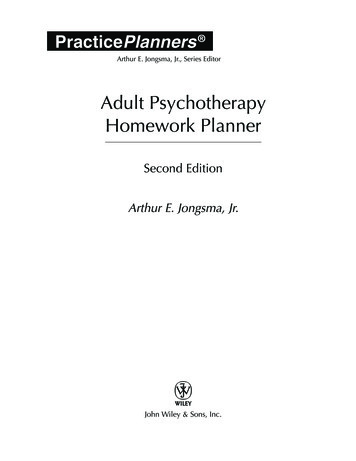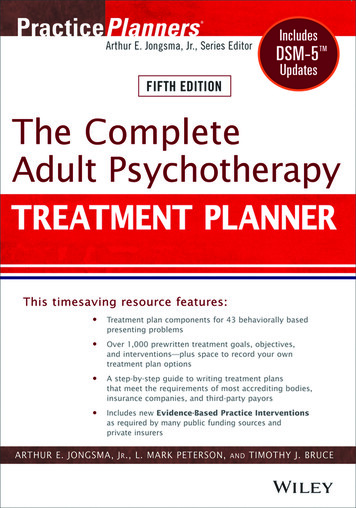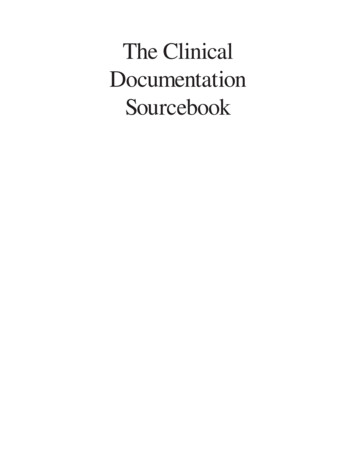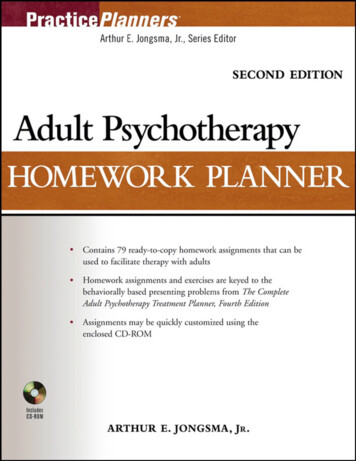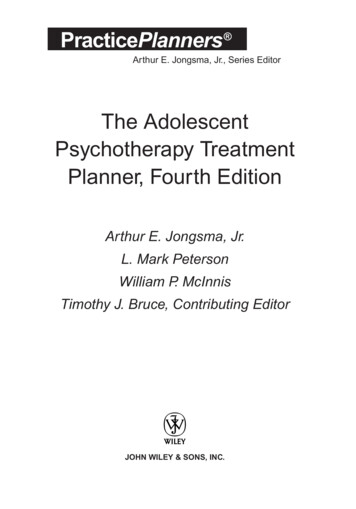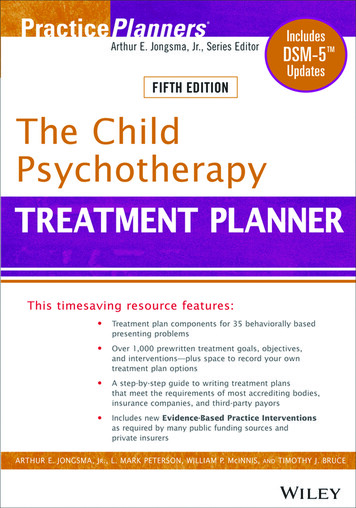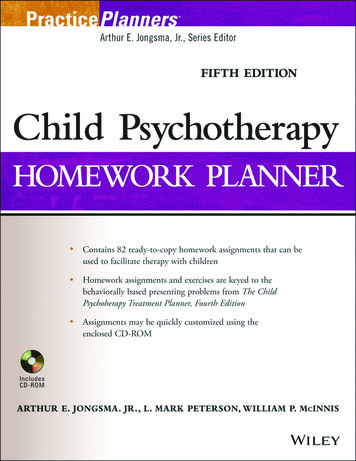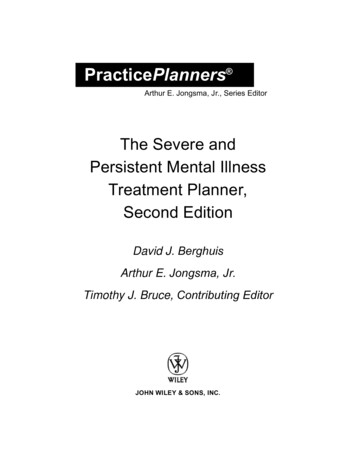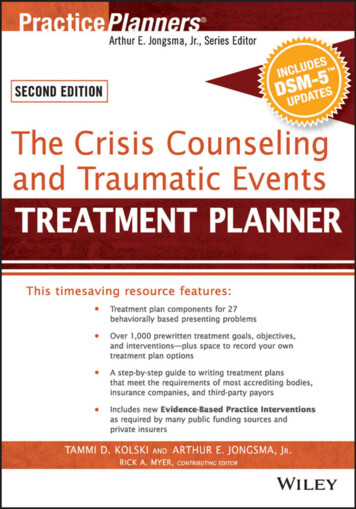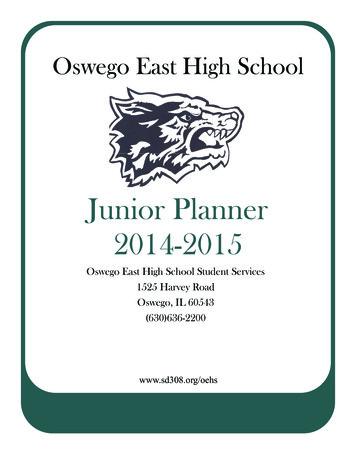
Transcription
Oswego East High SchoolJunior Planner2014-2015Oswego East High School Student Services1525 Harvey RoadOswego, IL 60543(630)636-2200www.sd308.org/oehs
OEHS Student Services2014 - 2015Last namesPhoneEmailKarla HoinkesDir. Of Student Services(630)636-2228khoinkes@sd308.orgLaurie HafenrichterCounselor (A – Cha)(630)636-2221lhafenrichter@sd308.orgMichelle NevarezCounselor (Che – Garc)(630)636-2236mnevarez@sd308.orgJulie AllenCounselor (Gard – K)(630)636-2230jallen@sd308.orgMelissa Gleason (Alisa Sloan)Counselor (L – Oro)(630)636-2240mgleason@sd308.orgJessica ZieglerCounselor (Orp – Sims)(630)636-2237jziegler@sd308.orgBrittan FatigCounselor (Sin – Z)(630)636-2238bfatig@sd308.orgCourtney Doyle-O’BrienCounselor Intern(630)636-4513cdoyle-obrien@sd308.orgKurt ThorsenCounselor Intern(630)636-4514kthorsen@sd308.orgDave MilosSchool Psychologist (A - K)(630)636-2204dmilos@sd308.orgAndrea PhillipsSchool Psychologist (L - Z)(630)636-2243aphillips@sd308.orgDina SchnableSocial Worker (A - Garc)(630)636-2205dschnable@sd308.orgBrianne KalusniakSocial Worker (Gard - Oro)(630)636-2244bkalusniak@sd308.orgDan BreyneSocial Worker (Orp - Z)(630)636-2239dbreyne@sd308.orgKatharine YoungSpeech Pathologist(630)636-2259kyoung02@sd308.orgCyndy ConleeRegistrar(630)636-2234cconlee@sd308.orgLinn KaneyStudent Services Secretary(630)636-2241lkaney@sd308.orgWendi WeberCollege & Career Ctr. Sec.(630)636-2245wweber@sd308.orgDanette JungelsBuilding Nurse(630)636-2280djungels@sd308.orgJacque NatonskiBuilding Nurse(630)636-2202jnatonski@sd308.orgEllen WolffSchool Nurse(630)636-4602ewolff@sd308.orgAdele DalesandroDean (A – Geff)(630)636-2225adalesandro@sd308.orgJerry WicksDean (Geg - Orm)(630)636-2216gwicks@sd308.orgMargaret DarnellDean (Ort – Z)(630)636-2233mdarnell@sd308.org
Important Junior DatesEventDateLocationCourse Selection andJunior ConferencesFebruaryOEHSACT School TestingMarcy 3, 2015OEHSIllinois CollegeExpositionNorth CentralCollege FairOEHS College Fairfor JuniorsMarch 3, 2105March 23, 2015April 13, 2015InformationLewis University,RomeovilleNorth Central College,NapervilleCounselors meet with juniors to discuss post-secondary plans and seniorclassesCollege entrance assessment testing (State)Held during the school dayCollege Fair6:30 p.m. – 8:00 p.m.Visit with college representatives from various colleges6:30pm-8:30 pmOEHSStudents meet with college and career representatives during the school dayFor more college and career information visit us at rvicesACT Assessment National Test DatesDates Test DateRegistration Deadline(Late Fee Required)April 18, 2015March 13, 2015March 14 – 2, 2015*June 13, 2015May 8, 2015May 9 – 22, 2015*September 12, 2015October 24, 2015*December 12, 2015*Offered at OEHS. Register online at www.actstudent.org to take a National ACT exam.ACT test fee waivers are available in the Career Center, see Ms. Weber.Test Preparation OpportunitiesAct Prep at OEHS –Tuesdays and Thursday after school from 2:30 to 3:30 Jan 27- Feb 26,2015 for English and Mat. (Free)Free Online ACT Test Prep –Visit www.kaplanatschool.com/oswegoeast. Under“Kaplan’s Program Options and Pricing” select “ACT on Demand.” Enter codeKAS2015ACT at checkout.ACT Practice Questions – www.actstudent.org (Free)Waubonsee Community College ACT Prep Class act/ (prices vary)Huntington Learning Private Test Prep – www.huntingtonlearning.comSylvan Learning Center Private Test Prep st-prepAP Test Prep – p.html
Post-Secondary OptionsOften students think the only options after high school are either going to college or going towork. Consider these opportunities when exploring your options:EmploymentEntry-level workApprenticeshipsEmployee training programsOn-the-job training programsSkilled trades and craftsSelf-employmentYouth apprentice programsArmed ForcesReservesROTCFull-time militaryService academiesNon-College Educational ProgramsContinuing education creditsAdult evening coursesCorrespondence coursesSelf-studySeminars and workshopsCertificate ProgramsTrade schoolsTechnical schoolsVocational schoolsBusiness schoolsNursing ProgramsCertified Nursing Assistant (CNA)Licensed Practical Nurse (LPN)Bachelor’s Degree in Nursing Science (BSN)College and Career Search EnginesCareer Cruisingwww.careercruising.comUsername: OswegoPassword: EastWhat’s Next Illinoiswww.whatsnextillinois.orgCollege Confidentialwww.confidential.comTwo Year ProgramsTrade schoolVocational schoolTechnical schoolBusiness schoolCommunity collegeFour Year ProgramsPublic colleges and universitiesPrivate colleges and universitiesStudy abroad programsUnderstanding Types ofPost-Secondary SchoolsUniversities:Larger institutions with specialized degrees inbusiness, engineering, pre-med, etc. They offer 2-year,4-year, and many graduate and professional degrees.Colleges:Generally smaller in size than a university. They offer4-year degree programs and some 2-year degreeprograms.Community/Junior Colleges:A small college offering 2-year degrees , certificate,and vocational programs. Many students attend localcommunity colleges with the intent to transfer to alarger institution to further their education.Online Programs:Offered by small and large accredited universities.Programs are offered online with potentially somecampus visits.Vocation/Career Schools:Specialized schools of training for specialized tradejobs such as mechanics, computer technicians,medical assistants, etc. Programs may vary requiringonly a few weeks to complete while others mayrequire a year or more. Upon completion, graduateswill receive a license, certificate, or an Associatedegree.
A SIMPLE GUIDE FOR OEHSJUNIORS“What Should I Be Doing Now?”Now Research colleges/universities. Career Cruising, www.careercruising.com is very userfriendly and can link you directly to the college or major you’re researching.User name: oswego Password: eastReview the admission requirements of the colleges that interest you the most. Check theacceptance range criteria for ACT and GPA and what high school coursework meets therequirements for admission. This information can be found on each college’s individualwebsite.Visit colleges. Schedule a visit through college websites, so you can begin to build arelationship with that college. Do not rule out a college/university due to sticker shock.Many private colleges are able to make it very affordable to students. Try to schedule anappointment with a financial aid officer at the college.Retake the ACT if you feel you did not perform to the best of your ability. Juniors take ACTexam on March 3, 2015 in school. The scores will be mailed to you 4-6 weeks after the testdate.ooo You can register online for the ACT at www.actstudent.org.Oswego East’s School Code number is 143-331. You will need this number to register!Check with colleges of interest to find out specific testing requirements. Registration datesand deadlines are posted on the ACT website.Take the SAT, if your college requires it. Register online at www.collegeboard.org .If you are interested in playing sports in college, be sure to register with the NCAA Clearinghouse at http://web1.ncaa.orgSummer FallStart building a resume or complete the Recommendation Information Form found on theStudent Service webpage. www.careercruising.com offers an easy resume builder in thePortfolio section. You will need one of these forms when you begin asking teachers forrecommendation letters for your college and scholarship applications.Practice writing answers to essay questions. The common application posts the 5 essayquestions for the following year in March. Go to www.commonapplication.org Even thoughnot all schools accept the common application this is still good practice for the types ofessays you will have to write for many schools and scholarships.Apply early! Check to see if the online application has been posted yet for the colleges youare interested in.Complete a Transcript Request Form for each college you apply to that requires an officialtranscript as part of the application process.Continue compiling information about which organizations award scholarships to graduatingseniors. (You may have to begin applying the summer before your senior year in high school.)
If you need a letter of recommendation, be sure to ask the teacher/counselor ASAP andsupply them with your resume or information form.Seriously investigate private scholarships and other student aid programs. Theapplications might not be available until later in your senior year, however, you can narrowdown your potential scholarship list.Create a personal profile at www.fastweb.com or www.scholarships4students.com to receiveinformation about public scholarships you qualify for based on your answers.Read the 1-15 emails sent from Student Services. This email will be sent to youapproximately the first and fifteenth of every month and will inform you of scholarshipopportunities and their deadlines.Attend Waubonsee Community College’s College Night, October 2015. There will be over100 colleges and universities throughout the country in attendance. Informationalpresentations will be given to learn about choosing the right college, financial aid, andattending Waubonsee. There is also a presentation in Spanish.December Attend the FAFSA/Financial Aid Night in December at OEHS.Winter Complete the Free Application for Federal Student Aid (FAFSA) as close to January 1st as youcan. You will need to do this with a parent. The official site for the FAFSA application iswww.fafsa.gov DO NOT go to fafsa.com where you are charged to file your application!Continue to research scholarships!College Visit HintsThe college visit is one of the most helpful resources in your college planning. A collegevisit enables you to see the physical setting and facilities of the college as well as visit withstudents and faculty.Tips on campus visits: Visit the College/University webpage to schedule a visit. Colleges have differenttypes of visits to choose from. Pick one that works for you. It is best to visit a college when it is in session and students are on campus. Takeadvantage of fall holidays such as Columbus Day and Veterans Day. Research the college before you visit. Talk to an admissions officer and financial aid officer. Imagine yourself on the campus. Can you picture yourself living there for fouryears? Make detailed notes about important information and impressions, so you cancompare campuses you visit.Questions to Ask During a College Visit: What are your most popular or distinguished programs? How many students will be in my first year courses? Are those courses taught byfull-time faculty or by graduate students? What kinds of work-study or internships are available? Am I likely to be admitted? What percentage of students receive financial aid? What percentage of students graduate within 4 years? What services do you offer after graduation for job placement?
- - 3 ' / , - ,3 '3 %% '( ,32-3 3 % ' .&& 13(!3 ' &.&3 "#3 #((%3 (. , 3 *. & '-,3!( & ,, ('3(!3 ,#& '3-(3 %% '( ,3 . % 3 ' / , - ,2 !! - / 3 2TotalEnglishSocialStudiesMathematicsScience Electives and Other RequirementsChicago State Eastern IllinoisGovernors StateNortheastern 15315Western Illinois 154135310315Illinois State15423122152 years of one foreign language or fine arts; and 2 years of electives,Northern Illinois1542363113162 units (one must be foreign language, art, or music); Up to three units ofthe required fifteen units may be distributed throughout any of the fivecategories of course work. Vocational education may satisfy up to threeof the units.41383 or 4123181541353123152 years of electives in foreign language, art, fine arts, music or vocationaleducation; if a foreign language is taken, it must include two semesters ofthe same language.2 years chosen from foreign language, music, the visual arts, theatre,dance and/or vocational education. ' / , -13(!3 %% '( ,Chicago1644333182 years of foreign language; 1 year of an elective.Springfield154437312318Urbana-Champaign15 or 15.544283 or 3.5142182 years of one foreign language or 2 years of fine arts, selected from art,music, dance and theatre are required.2 years of one foreign language are required; and 2 years (flexibleacademic units) from any of the five subject categories. Approved art,music, or vocational education courses may be counted in the flexibleacademic units category. (.-# '3 %% '( ,3 ' / , -1Carbondale15 or 16EdwardsvilleNOTES: Suggested Electives - includes other academic courses.1. Emphasizing written and oral communication and literature.2. Three units of English must be courses emphasizing written and oral communication andliterature.3. Emphasizing grammar, composition, written and oral communication, and literature; mayinclude not more than 1 year of creative writing or journalism.4. Studies in language, composition, and literature requiring practice in expository writing in allsuch work. Coursework should emphasize reading, writing, speaking, and listening.5. Emphasize history and government.6. One unit must be U.S. history or a combination of U.S. history and government.7. At least 2 years of history and/or government; other acceptable subjects are anthropology,economics, geography, psychology, and sociology.8. History and government are preferred. Additional acceptable social studies include anthropology, economics, geography, philosophy, political science, psychology, and sociology.9. One unit must be American History plus 1 unit of history, government, psychology, economicsor geography.10. Introductory through advanced algebra, geometry, trigonometry, or fundamentals of computerprogramming.11. Three to four units of college preparatory mathematics, including one year of geometry and oneyear of advanced algebra and/or trigonometry.12. Algebra I & II, and a proof-based geometry course. A fourth unit is highly recommended:trigonometry and pre-calculus, or statistics, depending on the student's area of interest.2 years of foreign language, music, vocational education or art2 years of academic or vocational electives.2 years of one foreign language or fine arts; and 2 years of electives.2 years of foreign language (FL),or 2 years of fine arts (FA) or acombination of 1 year FA/FL and 1 year of vocational education.2 years of foreign language, music, vocational education, art, theatre, film,religion, philosophy, speech or journalism13. One year of introductory algebra, 1 year of geometry, 1/2 year of algebra beyond theintroductory year, and 1/2 year of more advanced mathematics or fundamentals of computerprogramming.14. Algebra, geometry, advanced algebra, trigonometry. Typically, such courses ascareer/occupational mathematics, consumer mathematics, applied business mathematics,pre-algebra, and computer courses are not acceptable. 3.5 years of mathematics includingtrigonometry are required in the following curricula: Agricultural, Consumer and EnvironmentalSciences – agricultural engineering; Business – all curricula; Engineering – all curricula; Fineand Applied Arts – architectural studies; Liberal Arts and Sciences-specialized curricula inbiochemistry, chemical engineering, chemistry, geology, and physics.15. Laboratory sciences.16. Two units must be courses in the physical or biological sciences. One unit must be a laboratoryscience.17. One year of biology, 1 year of chemistry, and 1 additional year of earth science, physics, biology,or chemistry. (All must be laboratory sciences.)18. Laboratory courses in biology, chemistry, or physics are preferred. Laboratory courses inastronomy and geology are also acceptable. General science will not be acceptable.3) !3(!3-# 3 -3 3 % ' 3 # -3 ,3 / % % 3 -3000 ( " - .% - ('
College Language 101Academic Advisor: This person will help you select the correct courses, review course prerequisites, assistwith transfer information and help you with academic problems you may encounterAcademic Probation: All colleges require students to maintain a minimum cumulative grade point average(GPA) to remain in school. Any student not maintaining satisfactory progress toward his/her educationalgoals will be placed on probation.Academic Suspension: A student on academic probation may be placed on academic suspension if he/shefails to maintain or achieve the minimum GPA required. A student placed on suspension could be dismissedfrom the college.Accreditation: The approval by an outside agency that signifies a college or university meets high standards,which ensures that education provided by institutions of higher education meets acceptable levels of quality.Associate’s degree: The associate’s degree is earned by the completion of a program of study of a minimumof 60 credits.Bachelor’s degree: The degree given upon completing a college program of at least four years of academicwork. Usually there is a degree for a bachelor’s of arts or science.Catalog: A college or university catalog provides all types of information students need to know. It lists allthe programs of study offered as well as the requirements for those programs, plus admission procedures,philosophy and mission statements, financial aid, policies and procedures, student life, student services, andgeneral education requirements.Co-curricular activities: These are non-classroom activities that can contribute to a well-rounded education.These can include activities such as athletics, clubs, student government, social organizations and events, andvolunteer and community service opportunities.Counselors: Counselors can provide you with assistance with academic, career, and personal concerns. Theyoffer help in building academic and interpersonal skills on topics including time management, test anxiety,assertiveness, academic skills training, stress management and self-confidence building.Credit hours: Courses taken in college are measured by credit hours. To earn one credit hour, a studentmust attend a class for one classroom hour (usually 55 minutes) per week for the whole semester (usually 16weeks). More time is required to earn a credit hour in lab classes.Degree: A diploma given as official recognition for appropriate and adequate completion of a course of study.A four-year degree is usually a bachelor of art or bachelor of science. A master’s degree requires five to sixyears total and a doctorate is beyond that.Financial aid package: The total amount of financial help a student receives. Federal and non-federal aidsuch as grants, loans, or work-study is combined in a “package” to help meet the student’s need. Usingavailable resources to give each student the best possible package of aid is one of the major responsibilities of aschool’s financial aid administrator.Fraternities/sororities: (also called the Greek system) Fraternities (for men) and sororities (for women) aresocial organizations that are active in various activities. Through a process of mutual selection, called Rush(which takes place during a specified period of time), students may be offered the opportunity to “pledge” acertain fraternity or sorority. Not all colleges have these organizations.
FAFSA – Free Application for Federal Student Aid: The basic application form to apply for financial aidincluding grants, loans, and work-study programs.Full-time student: A college student who generally takes a minimum of either 12 units (credit hours) perquarter or semester. This number of units is usually required to maintain financial eligibility.Independent college: A school not supported by state taxes.Junior/community college: A junior/community college is often called a two-year institution of highereducation. Course offerings generally include a transfer curriculum with credits transferable toward abachelor’s degree at a four-year college, and an occupational or technical curriculum with courses of studydesigned to prepare students for employment in two years.Liberal arts college: A college where the emphasis is on a broad-based education, in which a student studiesa variety of different subjects in order to gain a better working knowledge of the world around him or herself,rather than focusing in and specializing in one area.Major: A student’s main field of study in college, usually requiring one to two years of specific courses withina four-year plan.Minor: About 18 credits in an area outside of a student’s major field of study.Prerequisite: Specific courses you must successfully complete before you can enroll for another specificcourse. Students must satisfy prerequisites and any other stated conditions before enrolling in a course.Registrar: The registrar is responsible for the maintenance of all academic records and may include suchduties as: maintenance of class enrollments, certification of athletic eligibility and student eligibility for honorrolls, certification of eligibility for veterans, administering probation and retention policies and verification ofthe completion of degree requirements for graduation.Scholarship: A gift of money that does not need to be repaid which is given in recognition of a student’sachievement, skills and talent. It may be based partly on financial need.Syllabus: A syllabus is an outline of important information about a course. This document is written by theinstructor and includes important dates, assignments, expectations and policies specific to the course. Theseare usually given to you during the first class meeting.Transcript: An official copy of high school or college grades.Tuition: The fee for instruction at a college or vocational school.Undergraduate: A college student who has not received a bachelor’s degree.Work-study: A federally funded program that makes part-time jobs available to students with financial need.
Applying for ScholarshipsStudents are encouraged to apply for scholarships that are offered through the college, as well asthrough other, external sources. Scholarship awards are typically based on factors such as financialneed, academic achievement, talent, community service and other criteria. Scholarships may benational or local.1.Start Looking Early and Do Your Research – Although the majority of scholarships are for highschool seniors, it’s never too early to begin researching scholarships. Utilize FREE online scholarshipsearch engines, such as, www.fastweb.com or www.scholarships4students.com to create a profilespecific to you.2. Assess Your Strengths – Inventory your strengths and give priority to scholarships that strongly fityour profile.3. Look Locally – Contact organizations, such as your high school (Check the One-Fifteen scholarship liston the school web page and Facebook Fan Page.), religious institutions, civic organizations andparent’s employer.4. Reality Check – The majority of awards earned by students are within the 250 to 2,000 range.5. Be Prepared – Make sure to read all parts of the application and understand what is required. Keep acalendar with important deadlines circled. Create a resume or info list of important information aboutyour classes, activities, community service , so you have information at the ready when it is time tocomplete the scholarship application.6. Take Time to Write Your Essay – Many times, an essay or writing sample can be the most importantpart of your application. Take the time to make sure it represents your best effort.7. Follow-Up – Check back on applications 2 -3 weeks after submission to make sure all materials werereceived.8. Be Smart – Beware of scholarship scams. NEVER PAY application fees or disclose credit card or bankaccount information on a scholarship application.9. Submit your FAFSA Early – Some scholarships will require a Student Aid Report (SAR) which youreceive after you have completed the FAFSA. Apply online in January of your senior year atwww.fafsa.gov to determine eligibility for federal student aid. To receive an early estimate of youreligibility for federal student aid, visit www.fafsa4caster.ed.gov10. Search Year ‘Round – Look for scholarships throughout your entire college experience.
Helpful Websiteswww.fafsa.ed.gov Free Application for Federal Student Aid (FAFSA)- Complete the application January 1 ofsenior year to determine if eligible for federal student aidstudentaid.ed.gov Have all of your FAFSA questions answered even those unique to your situation.www.fafsa4caster.ed.gov Provides an early estimate of your eligibility for federal student aidwww.collegeconfidential.www.fastweb.com Information on scholarships and financial aid. Create a portfolio and receive email alertswww.scholarships4students.com Provides links to a wide variety of scholarships and grantswww.scholarships.com Provides a customized report of scholarships and grantswww.cappex.com Create a profile to find the perfect college and scholarships for you. "What Are MyChances Calculator?" will provide you with your chances of admission to a particular collegewww.collegeillinois.org Resource for exploring careers, planning for, finding, applying to and paying forcollegewww.collegeconfidential.com Very helpful college search engine for finding and comparing schools to meetyour needs.www.collegeboard.com Association is composed of more than 4,500 schools, colleges, universities and offersprograms and services in college admissions, guidance, assessment, financial aid, and enrollmentwww.collegeplan.org Information on college selection, admission, financial aid, etc.www.collegeprofiles.com In-depth college profiles with information about academic programs, athletics,campus life, facilities, expenses, financial aid, etc.www.knowhow2go.org College is possible! Provides links to many scholarship and college search engineswww.zinch.com Connect with schools and scholarshipswww.whatsnextillinois.org Financial Aid 101 (follow the steps for assistance with college paying for college),Financial Aid Wizard (guides you through the financial aid maze), and the Scholarship Finder (complete aprofile to find matching scholarships)www.collegezone.com Resource for exploring careers, planning for, finding and applying to and paying forcollegewww.mycollegeguide.com Information on college admissions, scholarships, loans and college entrance examswww.careercruising.com Scholarship site that also includes career, college and employment information.User name: oswego Password: eastOswego East Student Services Website –http://www.sd308.org/oehsBecome a FAN of Oswego East Student Services
OEHS Student Services 2014 - 2015 Last names Phone Email Karla Hoinkes Dir. Of Student Services (630)636-2228 khoinkes@sd308.org Laurie Hafenrichter Counselor (A - Cha) (630)636-2221 lhafenrichter@sd308.org Michelle Nevarez Counselor (Che - Garc) (630)636-2236 mnevarez@sd308.org Julie Allen Counselor (Gard - K) (630)636-2230 jallen@sd308.org
